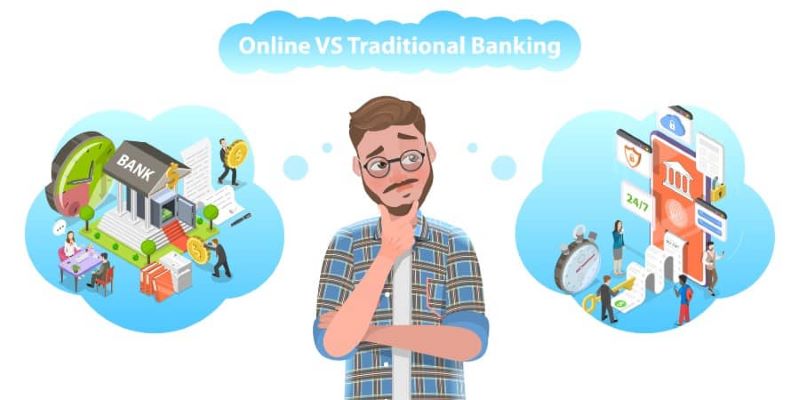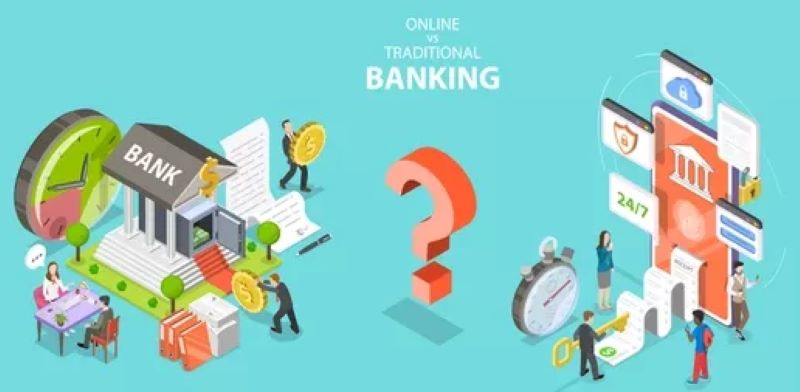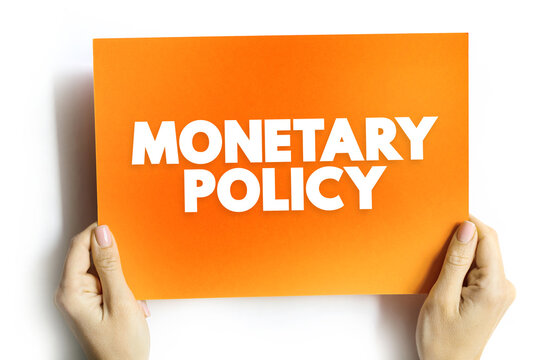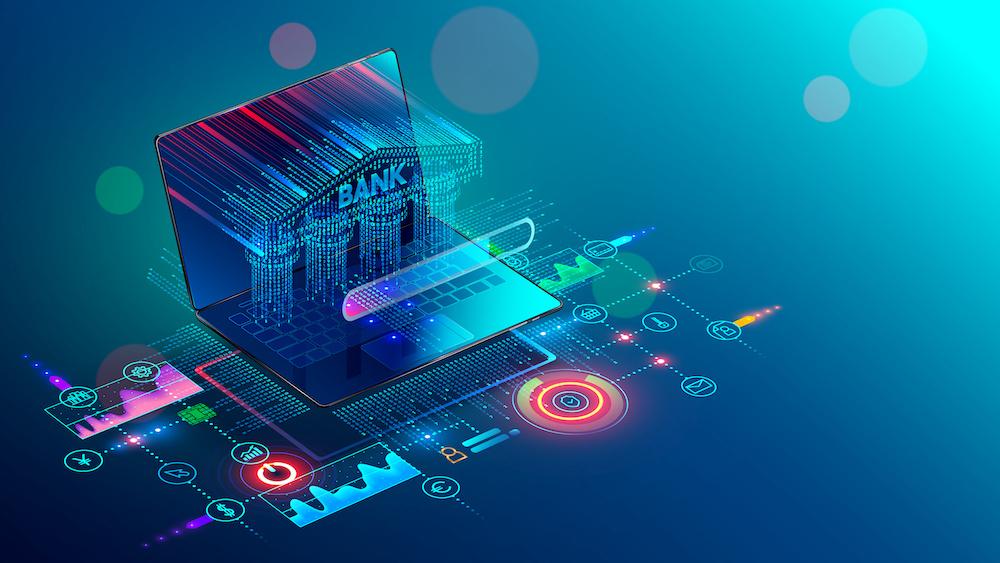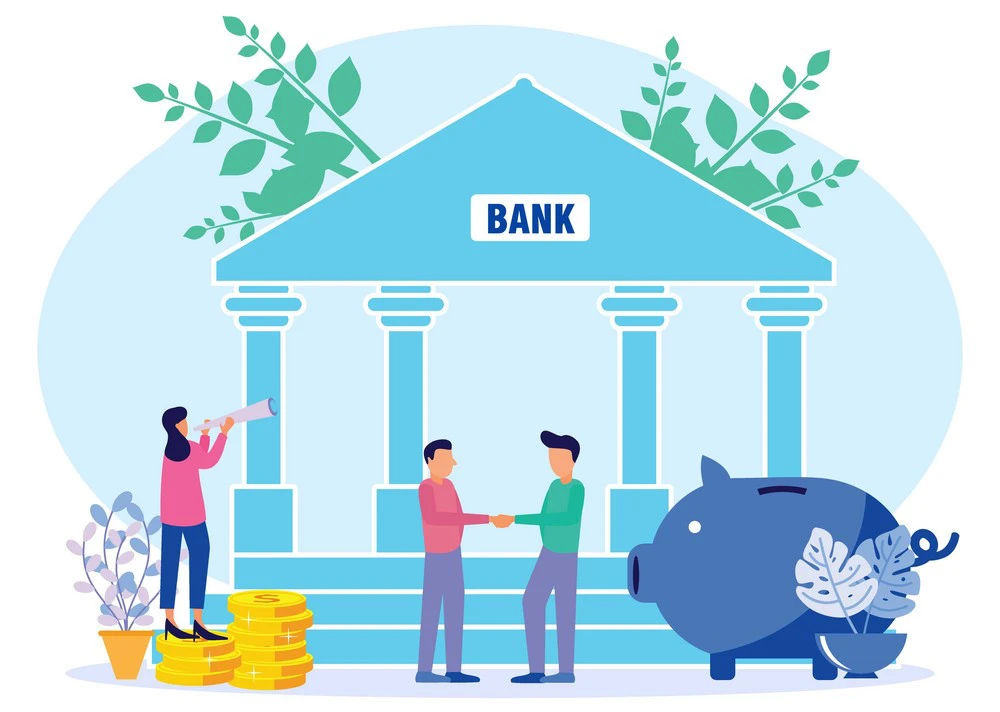In our fast-moving world, choosing between online banking vs traditional banking means picking a path that suits your daily life and financial goals. Do you enjoy the ease of a few clicks on your phone, or do you prefer the solid feel of a bank card in your hand? With the digital wave changing how we handle money, it’s crucial to understand what you gain—and what you might miss—on either side of this financial fence.
Let’s dive into the essentials of modern banking, from the evolution and features to the security measures that keep your money safe. Whether you’re depositing checks through a screen or at a counter, know that your choice will shape not just how you bank today, but also your financial future. So, buckle up as we chart the course through the sea of banking options!
The Evolution of Banking: From Branches to Digital
Comparing Traditional Bank Branches and Online Transactions
Think about the last time you went inside a bank. Long lines, busy days, and the drive there. Now, compare that to clicking a button at home. That’s online banking—fast, easy, and you can do it in pajamas. While branches give us folks to chat with, the web offers quick services without the wait.
The Rise and Impact of Branchless and Electronic Banking
Remember phone books? They’re almost gone, just like bank branches might be one day. Web and phone banking have grown a lot. We manage our cash, pay bills, and even open accounts—all online. It’s making our lives simpler in lots of ways. Security is key in making this safe for us. No one wants their hard-earned money at risk.
Talking about banking like this makes it clearer, right? It’s a mix of the old and the new, where one brings comfort and the other brings ease. And with each passing year, more people choose phones over teller lines. It’s part of a big change, one that’s making our money stuff faster and easier to handle.
Branchless banking means no more buildings. No parking spots to find or lines to stand in. It gives us power to handle our money from anywhere. High-tech stuff, like apps and smart security, helps us feel safe. We can watch over our accounts like hawks, night or day. Banks without buildings also let us save some bucks. They spend less on big spaces and can give us higher rates on savings. It’s something to think about if you’re saving for a big dream.
Electronic banking isn’t just websites, though. It’s also about being able to move money with just a few pushes on our phone. It’s real magic in our pockets. And it’s not just for the tech wizards! Anybody can learn it. This way of banking is reaching everywhere. It means no worries about bank times or finding ATMs.
What’s cool is how it’s changed our money habits. Some folks love seeing a friendly face and having a chat. But now, many more love the quick tap-tap to check a balance or pay for a pizza on the fly. It’s a new age where everything’s at our fingertips. It’s also great for people who can’t get out much. They get to do the same stuff without stepping outside.
We’re all different in how we like to do our banking. Some bank best by meeting people, and others love the speed of the web. What matters is keeping us and our money safe, no matter how we choose to bank. Each way has its own kind of shield against risks. Banks in the digital age work hard to keep our money under lock and key.
Banking has surely come a long way from those big old buildings to sleek apps on our gadgets. With each swipe, tap, and click, we’re seeing a fresh world of managing cash. It’s not just something from science fiction anymore—it’s how we live now. And the best part? It’s something we can all join in on, finding the path that’s right for our own cash and comfort.
The Convenience and Features of Modern Banking
Exploring the Diversity of Mobile Banking Features
Mobile banking keeps getting better. It lets you do lots without ever seeing a bank. Check balances? Easy. Transfer money? No sweat. Pay bills? Just a few taps. You can even deposit checks using your phone’s camera. Banks know that life is fast, and their apps help you keep up.
But why are these features a big deal? Let’s dive in. Mobile banking keeps your money close. No need to find a bank branch or ATM. You can bank while in line for coffee. With everything on your phone, your bank is open 24/7.
You might worry, “Is mobile banking safe?” Banks use top-notch security, like fingerprint access, to protect your money. They work hard to keep hackers out and your cash safe.
Some apps even help with budgets and savings goals. They do the math and show you where your money goes. This teaches you how to save and spend smarter.
Staying on top of your finances couldn’t be simpler with mobile features. You get real-time updates, which means you see what happens with your account at once. No surprises on your monthly statement.
The Growth of Digital Wallets and Bank Account Management Online
Digital wallets are now a thing. They let you pay with your phone, so you can leave your cards at home. You load them with your cards’ details and pay with a tap. You can even store loyalty cards and coupons.
Online banking lets you handle your accounts with ease. You can open a new account or talk to support without leaving home. Everything is at your fingertips.
Think about high-yield savings accounts. They often have better rates than traditional ones. Plus, you can open one right from your phone or computer. This means more money for you with less hassle.
With online banking, you’re in control. You can move money between accounts anytime. It’s easier to stay on top of your finances. And if you run into trouble, there’s often a chat or a hot-line just a click away.
Branchless banks don’t have physical spots, which can lower their costs. These savings can then pass on to you with better rates and lower fees.
Many people wonder about the safety of online banking. Rest easy; banks use strong cyber security measures. They guard your personal and banking data like a treasure.
Remember the day when you had to wait in line at the bank? Now you don’t. Online and mobile features let you do it all without the wait. This is why many folks pick mobile and internet banking. It fits today’s busy life just right.
Mobile and online banking make managing money simple and fast. They fit the way we live now. Security, ease, and constant access mean you can bank on your terms. This new age of banking isn’t just about saving time; it’s about giving you power over your financial life. It’s banking that’s ready when you are, wherever you are.
Ensuring Security in a Digital Banking Age
Digital Banks Security Protocols vs. Physical Bank Safeguards
Digital banks keep your money safe, just like physical banks do. They use strong security to protect your account. How do digital banks protect you? They use tools like encryption. This makes your data hard to read for hackers. They have other ways too. It’s like locking your door with a secure deadbolt.
But the question stands: Do digital banks have better security than physical ones? Both use strong methods; but digital banks were born in the high-tech era. So, often, they are ahead. Physical banks also work hard on their security. They have cameras and guards. But digital banks focus on cyber threats which grow each year.
Cyber Security Measures in Online Banking and the Role of FDIC Insurance
Online banking must be safe for users. It involves important cyber security steps. These include monitoring your account well and keeping secrets safe. Also, getting alerts for odd activity helps. If something looks wrong, the bank can block it. Simple, right?
And what about FDIC insurance? It’s there to keep your money secure in banks. FDIC stands for Federal Deposit Insurance Corporation. It’s a big deal and gives peace of mind. How does FDIC insurance work for online banks? The same as with traditional banks. Up to $250,000 of your money in the bank is safe, even if the bank fails.
Using the internet for your banking is common now. It’s easy to see why many trust it. You can check your account, pay bills, or even get a loan with just a few clicks. Plus, you can do it all from your couch or coffee shop. It’s not just handy; it’s changing how we handle money. Digital banks are driving this change.
But don’t forget about physical banks. Some still like talking face to face and getting help in person. For them, going to the bank is best. It’s about what works for you. But always be sure the security is top-notch, either way.
When you bank online, you might worry about hackers. Good news is, online banks know this. They work very hard to keep your account as safe as your goldfish in a tank. They use tricky puzzles called encryption. This keeps your info safe from sneaky eyes.
Also, know that being careful helps a lot. Don’t share your password. Check your bank’s app for locks and alerts. And if you get a strange email asking for your bank details, don’t answer it. That’s a bad guy’s trick.
Digital banking lets us say bye to long bank lines. Yet, we still have power over our safety. Understanding security steps helps a lot. And with FDIC insurance backup, we rest a little easier. Choosing how to bank is a big step. It’s great we have options to pick what’s best for us. Whether you swipe or stroll to your bank, stay smart and stay secure!
Shaping the Future of Personal Finance
The Integration of Financial Technology in Consumer Banking Preferences
People now want banking to be easy and quick. Thanks to tech, it can be. Banks got smart, using cool tools that change how we handle money. No need to visit a bank when your phone does the job. Imagine paying bills while chilling at home, or getting cash without an ATM. That’s today’s banking. Tech like apps and online services makes it happen.
Online banking wins with 24/7 access and instant services. Want to check your balance? Easy. Need to send cash? A few taps, and done. These perks are huge if you’re always on the go. No more waiting for banks to open. Or long lines. Nope. Log in and manage your money fast and easy.
But get this: online banks take security super serious. They use top-notch tech to keep your money safe. Think of it like a digital vault, only you have the key. No worries about someone stealing your cash here. Banks use complex tricks to block hackers and protect your info.
Online Financial Literacy and Investment Services: Digital versus Physical
Knowing about money matters, and the web is here to help. Online, there’s so much to learn about finances. If you want to spend smart or save more, digital tools and info are there for you. Use apps to track what you buy or save for a dream trip. Cool, right?
Investing is part of money-smarts too. Online investment services make it simple. You can start small and learn as you go. No need to be rich or a pro. Plus, doing it online means help is just a click away, any time. No stress about making time for bank meetings. You grow your money on your terms.
So, why choose online over traditional banks? It’s all about what works for you. If you like face-to-face, a regular bank has your back. Some people like talking to someone they know. It feels safe and familiar. But if you’re all about easy, fast, and on your phone, internet banking is your friend.
What’s really cool is how tech is blending both worlds. Some online banks even let you chat with real people when you need. And traditional banks? They’re stepping up, offering more online stuff to keep up. It’s a win-win. You get the human touch when you want, and tech-savvy services too.
In the end, you’re in the driver’s seat. Choose the banking that fits your life. Love the tech or keep it classic — your money, your choice. The best path is the one where you feel comfy and in control. Happy banking, folks!
In this article, we explored how banking has changed from local branches to digital spaces. We saw how online transactions offer a new kind of convenience. Then, we examined how apps and digital wallets make managing money easy. We talked about how important it is to keep your money safe online. Security steps in digital banking and FDIC insurance play big roles there.
We also looked ahead at how tech shapes our money habits. Now we can learn about investing and saving on the web, not just in person. The world of banking keeps evolving, and it’s clear that digital options are here to stay. They make our lives easier and give us more control. Remember, it’s all about finding a balance that works for you. Stay safe and keep learning, and you’ll make the most of modern banking features.
Q&A :
What are the main differences between online and traditional banking?
Online banking primarily refers to the ability to perform banking transactions digitally via a bank’s website or mobile app without the need to visit a physical branch. This includes monitoring account activity, transferring funds, paying bills, and more. Traditional banking typically involves face-to-face interactions at a bank branch for various services like depositing checks, withdrawing cash, and engaging with bank staff for assistance.
Is online banking safer than traditional banking?
The safety of online banking has greatly improved over the years with the use of advanced security measures such as encryption, two-factor authentication, and fraud monitoring systems. However, it requires users to be vigilant about cybersecurity practices, such as using strong passwords and secure networks. Traditional banking’s physical processes also have security measures but can be susceptible to different types of risks like theft or human error.
Can I access all traditional banking services online?
While online banking services have expanded, there are still some limitations. Most day-to-day transactions and services are available online, including fund transfers, bill payments, loan applications, and account management. However, some services, particularly those that are more complex or require notarization, such as setting up certain types of accounts or closing a mortgage, may still require a visit to a branch.
What are the advantages of online banking over traditional banking?
Online banking offers numerous advantages such as convenience, as it is available 24/7 and can be accessed from anywhere with an internet connection. It also often allows for faster processing of transactions and provides tools for easy record-keeping and budget tracking. Moreover, online banking can offer cost savings as there are often lower fees associated with digital transactions and maintenance.
How does customer service compare between online banking and traditional banking?
Traditional banking is known for its personal touch, offering in-person customer service where relationships can be built with bank staff. Online banking, while not featuring in-person contact, provides various customer service options like live chat, email support, and phone assistance. Online services are also frequently equipped with detailed FAQs and help centers for self-service assistance.


